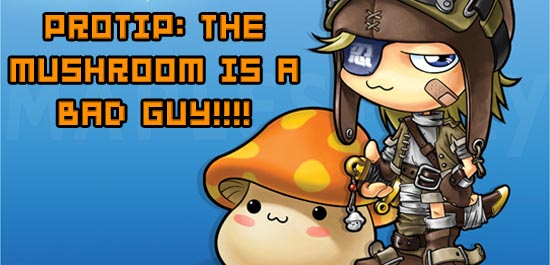I recently interviewed Nexon’s Min Kim
for Worlds in Motion, where I’m editor when not here at Destructoid. I cover bizness news related to online worlds, social networking, and MMOs that work on the free-to-play, pay-for-goods model. Nexon is, as you know, like, a ridiculously successful company in this space, and one of the more amazing things is that in this crazy 3D world in which we all live, one of its most successful longstanding games, MapleStory, is a 2D sidescroller. I reviewed MapleStory for the lil’ Online World Atlas that I do over there, and I found the Asian-influenced, cutie-sprite oldschool look really charming; as I said, it reminded me of playing strange nonsense Hudson Soft-type games on my Turbo Grafx 16 back in the day.
MapleStory has millions and millions of players worldwide — I’ve heard the figures pegged at anywhere from 30 to 60 million users. When you think of how big a deal people like Newsweek and Time think Second Life is, reflect that Second Life has only about 7 million. On top of that, MapleStory has been thriving for almost five years now, and growing every year — after about five years, the majority of MMOs have maxed out their lifecycles.
When I asked Kim about why MapleStory’s been so successful in a relatively tricky market, his answers are pretty much what you might guess — fresh content constantly, listening to what the users want, being unique graphically, and having a strong community. After all, the difference between MMO and just plain old O, as in, uh… you’re the O-nly one playing (isn’t that what it stands for?) is other people, right? So what does your MMO community mean to you, and how does it affect the experience of gameplay?
The community element is one in particular that a lot of players in this space are talking about quite a lot lately. There’s this huge gold rush going on for MMOs and virtual worlds; just about everyone has realized they can make a ton of money by aiming a community-oriented product at the “sweet spot” aged about 14-17. Especially if they can get those kids to bring their friends. Saying that peer pressure drives site loyalty is a bit of a cynical way of looking at it, but if you have a MySpace or Facebook account, why’d you get one? Because you had some friends who were using it. And once you’re sick of it, why do you keep logging in? To see what your friends are up to, of course.
In other words, a sense of community and shared experience drives revenue, because it keeps users coming back. And for sites like Twitter, Digg, Flickr (why do dot-coms have the stupidest names ever?) it’s pretty clear they wouldn’t be big hits without that element. But what about MMOs?
I played MapleStory; I still play it, sometimes. I’m not enormously fond of action gaming on a keyboard; I could never become accustomed to it, and maybe that’s the reason my patience for MMOs is fairly limited. As far as I’m concerned, my PC gaming career was point-and-click from the time I was, like, five (yay for HyperCard) so keyboarding still feels archaic and cumbersome to me. I suppose that could be remedied by getting a USB controller, but I just don’t care all that much.
And that’s the problem. I think that the community element that could really drive an MMO is still not bulls-eyed yet; I don’t care, because most MMOs I have played still feel a lot like any old-school RPG to me — only more skeletal, because of the open-ended world and the lack of a presiding narrative. It’s grind and gather, and it tends to bore the hell out of me. The variable element is supposed to be the presence of others; you and the others are supposed to create your own story. But all that really ends up happening, in general, is that you don’t grind alone. You form teams not to create a story, but to grind more effectively.
I know that for, say, WoW loyalists, they feel rather connected to their guildies and consider them friends. We hear a lot about how some people can talk to their cohorts in MMOs more than they can to their friends. But there seems to be a disconnect there — you’re fostering a social relationship based on your real life, your real identity, whether you’re just being friendly or you’re confessing your life’s secrets, your problems with your girlfriend or your favorite kind of beer. All of that, against a backdrop of elves, orcs, monsters and mysterious artifacts? Why do the social relationships in MMOs seem primarily strategic, a function of your gameplay style? Is it because despite all the attention paid to this “exciting new” 3-dimensional connected reality, people don’t really want to escape all that much?
I don’t mean roleplaying per se, because I know there are plenty of people doing that on designated servers — though I confess it surprises me that they’re in the minority. What I’m saying is, with an MMO there is the opportunity for users to literally build an entire story of their own together; there are no limits on what they can design. And yet primarily, it’s team up, kill things, sell loot, repeat. It’s either that, or they don’t talk much at all because they’re busy — wait for it — playing the game. Seems to me there’s a lot of lost opportunity there.
I think that if socialization and gaming were hybridized a bit more fluidly, then we might have that truly lifelike, compelling and immersive gaming experience we all keep saying we want. What do you guys think?


